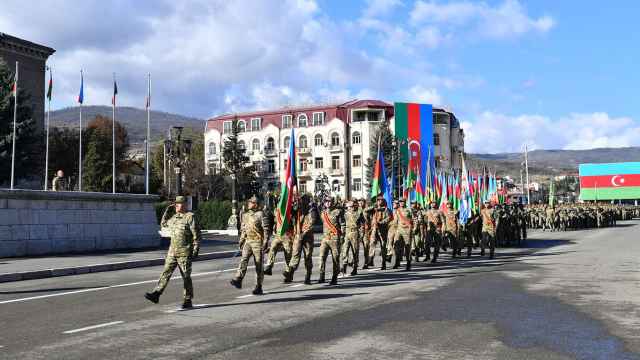The reason for the recent Russian Airbus A321 crash in Egypt's Sinai remains unclear, but a growing number of press reports and public statements made by non-Russian decision-makers and experts indicate that the crash might have been caused by terrorism. A Sinai-group affiliated with the Islamic State claimed responsibility and said it acted "in response to Russian air strikes that killed hundreds of Muslims on Syrian land."
Whether this is true or not remains to be seen, but it certainly raises questions about the wisdom of Russia's military involvement in Syria. The Russian government has justified its military campaign as an inevitable step toward rolling back the terrorist groups inside Syria, most notably the Islamic State. To achieve that, President Vladimir Putin wants all major players to coalesce around the Syrian government of President Bashar Assad.
As Putin said in a speech to the United Nations General Assembly in late September, it would be a "grave mistake to refuse to work with the Syrian government and its armed forces." He drove this point home when he hosted Assad in Moscow in mid-October and announced that Russia was providing "aid to the Syrian people (read: the government) in fighting the international terrorists."
The question of whether terrorist groups are really the main target of the Russian attacks has caused a new controversy between Washington and Moscow, which is probably rooted in a difference of opinion about whether the rather moderate opposition forces also constitute terrorist organizations.
However, Putin's attempts to portray the Syrian president as the sole alternative to Islamic terrorism is misguided. A closer look at the facts suggests that the Assad regime's continued existence has not diminished terrorism, it has been one of the root causes of it.
The rise of the Islamic State and other terrorist players –– and their growing support in places like Sinai –– would not have been possible to the extent that we have witnessed it, if not for the existence of a much despised foe in Assad. In the wake of the ongoing civil war, with more than 200,000 estimated deaths, Assad has increasingly been seen as the embodiment of a ruthless Arab dictator.
Assad's battlefield alliance with Shiite groups, most notably Iranian special forces and Hezbollah, has given Sunni extremists — such as the Islamic State that have been recruiting followers from all over the world — an additional tool to get their message across. The results of this global recruitment campaign are horrifying.
Several months ago, Reuters reported that a UN assessment concluded that the number of foreign fighters in Syria and Iraq combined –– the vast majority being in Syria –– has climbed to 22,000 recruits from about 100 countries. Recent developments have been particularly troublesome. Between mid-2014 and March 2015 the recruitment rate was estimated to have grown by 71 percent. In other words, the trend is going from bad to worse.
It is perfectly true that the international community has a "common enemy" in the Islamic State as Russian Foreign Minister Sergei Lavrov pointed out during a major international conference on Syria. But every government also has a particular interest in reversing the trend of foreign fighter recruitment. Unlike the domestic recruits of terrorist groups, foreign fighters might very well return to their countries of origin after having received additional training and further indoctrination in Syria.
The key to a solution to both –– the quagmire that has unfolded in Syria and the threat posed by Islamic terrorism –– is to deprive the terrorist groups of their main propaganda tools and to form a new Syrian government that excludes Assad (and his foreign Shiite allies) but includes representatives from all of the non-fundamentalist groups involved in the civil war. Otherwise thousands of militants from the former Soviet Union might not only "return back home" one day as Putin warned, but might also bring friends and explosives with them.
The likely result would be a huge number of terrorist attacks that could be even more disastrous than the plane crash in Sinai, whether it was caused by terrorism or not.
Sven-Eric Fikenscher is an associate with the Project on Managing the Atom at Harvard Kennedy School's Belfer Center for Science and International Affairs.
A Message from The Moscow Times:
Dear readers,
We are facing unprecedented challenges. Russia's Prosecutor General's Office has designated The Moscow Times as an "undesirable" organization, criminalizing our work and putting our staff at risk of prosecution. This follows our earlier unjust labeling as a "foreign agent."
These actions are direct attempts to silence independent journalism in Russia. The authorities claim our work "discredits the decisions of the Russian leadership." We see things differently: we strive to provide accurate, unbiased reporting on Russia.
We, the journalists of The Moscow Times, refuse to be silenced. But to continue our work, we need your help.
Your support, no matter how small, makes a world of difference. If you can, please support us monthly starting from just $2. It's quick to set up, and every contribution makes a significant impact.
By supporting The Moscow Times, you're defending open, independent journalism in the face of repression. Thank you for standing with us.
Remind me later.






